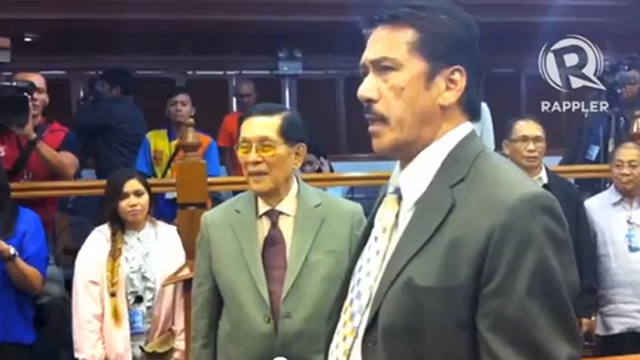SUMMARY
This is AI generated summarization, which may have errors. For context, always refer to the full article.

MANILA, Philippine – Plagiarism is plagiarism, committed wittingly or unwittingly.
This much is clear for Senate President Juan Ponce Enrile, who delivered a speech Wednesday, November 14, a day after an ethics complaint was filed against Senate Majority Leader Vicente Sotto III for alleged plagiarism.
He urged an investigation into alleged plagiarism by any senator, in apparent reference to Sotto. Both senators are longtime political allies; Sotto belongs to the so-called Enrile bloc in the upper chamber.
“We are not condoning the act of plagiarism in this Senate. Far from it. If there is anyone of us wittingly or unwittingly who commits this act, then I’m sure that that member would be man enough or honorable enough to stand up and answer for it,” Enrile said.
On Tuesday, November 13, Sotto apologized for copying quotes from the late US Senator Robert F Kennedy without attribution. But the former comedian denied it was plagiarism, explaining he did not intend to steal Kennedy’s words.
Sotto claimed he was clueless the quote came from Kennedy. He got this “inspirational line,” the senator said, from a text message sent by a Christian leader. “Kung sa tingin nila ay kinopya at tingin ng Kennedy family, kinopya ko, puwede sapagkat kinopya ko nga sa text iyon,” Sotto said. (If they think I copied it and the Kennedys think I copied it, that’s possible because I did copy it from the text.)
Plagiarism is commonly defined as stealing another person’s thoughts or words by failing to attribute it to the original author, intentionally or not.
But Sotto on Tuesday said the Senate – whose journals are also considered scholarly references – defines plagiarism differently. (Watch more in the video below.)
“Iba po ang pananaw sa academe. Sa academe kasi ang pangongopya bawal at kung anu-ano ang bawal. Pero dito ho sa Senado, hindi po iyon, ibang usapan po iyon pero wag na iyon.” (The academe has a different view. In the academe, copying is prohibited, they prohibit all sorts of things. But here in the Senate, it’s not. It’s another discussion.)
Different tune
Despite his speech, Enrile sang a different tune on Monday, November 12, after news broke that the late US senator’s daughter, Kerry Kennedy, called Sotto’s attention for plagiarism.
“We cannot be questioned for what we say inside this chamber anywhere, not because we are a special breed but because that is the immunity given by the sovereign people so we can speak on any subject under the sun,” Enrile told reporters Monday. “Those people who do not understand it, they’re ignorant of constitutional law, of the very Constitution they are supposed to espouse.” (Watch more in the video below.)
He even laughed it off with Sotto, who is accused of plagiarism by translating Kennedy into Filipino and passing off the quote as his own. “Mabuti nga tinagalog mo si Kennedy. Tatagalugin ko rin si Socrates!” (It’s a good thing you translated Kennedy. I will also translate Socrates!)
Now, Enrile said he is against plagiarism, and has “never done any act to copy or even think of appropriating unto myself the thoughts the intellectual property or the ideas of other people.”
The Senate President has one more term remaining at the Senate. His son, Jack, is running for senator in the May 2013 elections.
Enrile said “no one is above the law,” even with the parliamentary privilege of free speech that Sotto has invoked.
He said no senator is immune to an ethical complaint, and everyone “can be investigated by the members or their peers and, if warranted, disciplined even to the extent of being expelled as a member of this house.”
“The constitutional privilege of freedom of speech granted to us was given to us to enable us to speak on any issue, good or bad, for the information of the people, so that they will know what is going on. No one is immune from being investigated for misconduct done by us,” Enrile said.
However, Enrile, a lawyer, stressed the importance of due process.
“(No) one can say that by the mere fact that they have filed an ethics complaint against any member of this house, they have already proven their case… The law cannot condemn without any hearing. Otherwise, this will not be a government of laws, this will be a government of men,” Enrile said. – Rappler.com
Add a comment
How does this make you feel?
There are no comments yet. Add your comment to start the conversation.